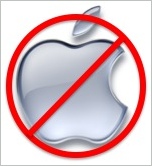-
Apple to Make Cable Set-Top Boxes? Not. Going. To. Happen.
The Wall Street Journal's lead story this morning is that Apple is meeting with large U.S. cable operators about building an Apple set-top box that would deliver cable programming and other content. Typical of all rumors relating to Apple, no credible source is cited (just "people familiar with the matter") and an Apple spokesman declines to comment. My take on this? Barring cable industry executives taking complete leave of their senses, the likelihood of this actually happening is next to zero.
Yes, as the Journal article points out, there may be potential benefits of an Apple deal, like reducing operators' capex for set-top boxes and creating a more user-friendly viewing experience. Then there's the idea of operators
 benefitting from Apple's halo which could address would-be cord-cutters and even cord-nevers (more on that topic yesterday). And of course, here in the U.S., TiVo has essentially been doing this for years. This is in fact the set-up I have - a TiVo Premiere box with a "CableCARD" bringing in Comcast's programming.
benefitting from Apple's halo which could address would-be cord-cutters and even cord-nevers (more on that topic yesterday). And of course, here in the U.S., TiVo has essentially been doing this for years. This is in fact the set-up I have - a TiVo Premiere box with a "CableCARD" bringing in Comcast's programming.
The idea of cable operators helping escort Apple into the living room would be like letting the proverbial "fox into the henhouse." Online viewing may be booming and tablets all the rage, but when it comes to the coveted living room, cable operators (and indeed the broader pay-TV industry) still reign. Despite changing consumer behaviors, the living room is still the destination for long-form entertainment, and will be for some time. NBC's record ratings for its Olympics broadcasts, which occurred despite it making most competitions available online, are just the latest evidence of TV's ongoing dominance.
If they were to let Apple into the living room, cable operators would be effectively ceding long-term ownership of their subscribers to Apple. Yes, they'd still be sending the bills, providing the customer service and supplying the programming, but to the user, the "experience" would be all Apple. And of course nobody does user experience better than Apple. Over time, as Apple set-top boxes proliferated, the company's leverage over cable operators would only increase, potentially upending the industry's economics.
One perfect example of how an Apple set-top could harm the industry is that it could help shine a far brighter light on the shortcomings of the multichannel subscription model. Most viewers know what research constantly bears out - that they only watch fewer than a dozen channels on a regular basis. Of course that means they're paying for lots that they don't watch. An Apple set-top that allows cable subscribers to easily configure their experience for just those channels they care about would let them quickly do the math of what they really pay for cable, say $80 per month for 10 channels watched, so $8 per channel (gee, I can even see an app for doing this!). As I've written in the past, non-sports fans in particular would gain an awareness of how much they're subsidizing expensive sports networks.
While this is of course possible for subscribers to do today, it's still abstract for most because of today's clunky set-tops. Once subscribers have a better sense of what they're paying for and care about, you can bet they'll begin agitating for an a la carte alternative approach. Just look at how the superb HBO GO app has gotten people fired up about subscribing to HBO as a standalone channel. Before you know it, regulators would start paying more attention.
Yet another wrinkle of an Apple set-top is that it would enable other content providers, through their apps, to have equal access to subscribers. Recently News Corp.'s Jon Miller said "TV is an app" in the sense that it's becoming available across platforms. Still, when it comes to on-TV viewing, cable operators shouldn't want their service to be just another icon sitting next to those of Hulu Plus, Netflix, YouTube or others. And that's what would surely happen with an Apple set-top. Look no further than how SmartTVs' navigation screens look already.
Unlike the music industry was 10+ years ago, cable is not currently reeling, in need of Apple's help to overcome rampant piracy. Nor is it the wireless industry, where the iPhone was able to create a massive new revenue stream in data plans for carriers. Rather, there are signs, as with Comcast's new X1 set-top, that cable operators have awoken to the idea that new technologies allow them to build top-notch user experiences of their own. Maybe not as great as Apple's, but a huge improvement over the past.
If cable executives are foolish enough to outsource living room innovation to Apple, they'll surely end up on the short end of the stick. I'm betting they know this.Categories: Cable TV Operators, Devices


